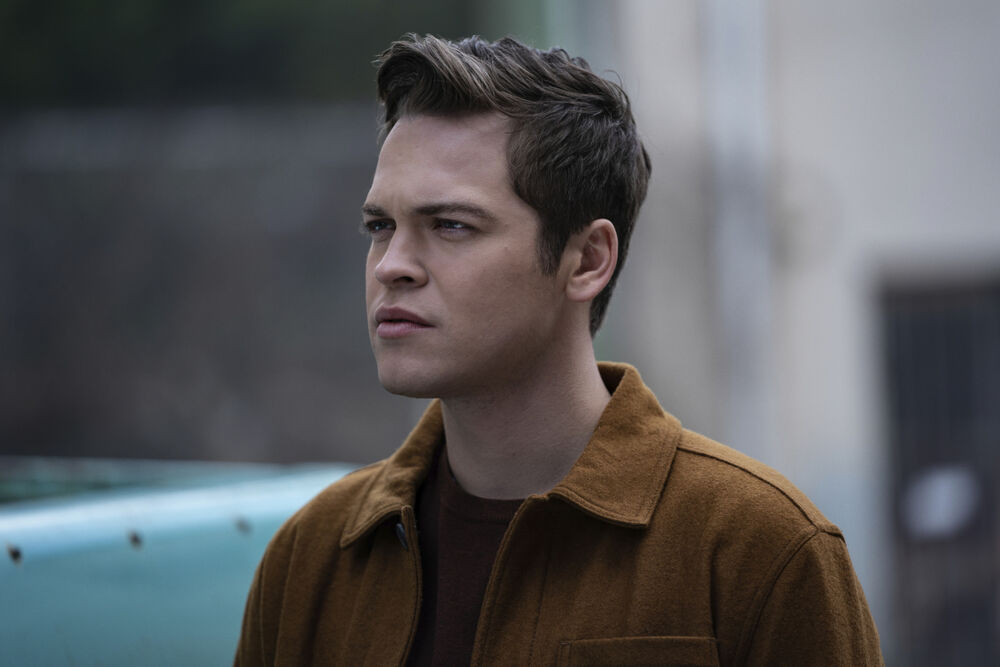Carry On, My Dead Girlfriends: Sam Winchester
July 29, 2021
Welcome back to the #DFGRR's signature discussion of the gender-based violence in popular media. Today's target is Supernatural, our first contestant franchise to to incorporate God and Lucifer as characters (although unlike Bonanza, it has no sign of either Jesus or the Easter bunny.)
Content Warning: Like all of our contestants, Supernatural has a lot of violence against women. In addition, it makes many references to sexualized violence. If that's disturbing for you, feel free to skip the parts marked out below.
The Series
As we've previously discussed, the Supernatural universe is a very dangerous place for women in general.
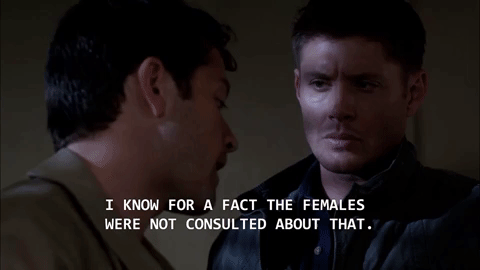
Supernatural is also a noticeably self-aware show, with recurring villains saying "see you next season, boys;" episodes named cheeky things like "Jump the Shark" and "Slash Fiction;" and the character of God appearing as an author. Logically, therefore, one could expect there to be in-universe commentary on the high female death rate.
Is there?
Yes, but all of it is directed at Sam Winchester's dead girlfriends. Instead of general observations about how dangerous the world is, we get the Winchesters' ally Charlie saying:
Congrats on saving the world, sorry you have zero luck with the ladies.
- "LARP and the Real Girl"
And Sam telling a church abstinence group that:
Every woman I've ever had relations with... It hasn't ended well.
- "Rock and a Hard Place"
Or Dean objecting to Sam's engagement with the argument:
Have you forgotten the average lifespan of your hookups?
- "Season Seven, Time for a Wedding"
In addition to the brothers joking:
Sam: Dean, what do we know of that has Jason Bourne fighting skills, dies a lot, and has a history with violent women?
Dean: I don't know--you?
- "Remember the Titans"
There is even a one-off villain who specifically targets Sam's previous sex partners, as revenge for things Sam did while he was *checks notes* wandering the earth as as soulless shell of himself for an entire calendar year.
I found the connection between the missing chicks. They all banged the same dude...YOU!
- Dean, "Unforgiven"
Therefore, although he's not the only character to lose women he loves, our main contestant from Supernatural is:
Sam Winchester

And frankly, Sam Winchester (Jared Padalecki) is difficult to describe. Compared to our other contestants, he tends to take matters up to 11. None of our contestants are prudes, but Sam's the only one to pay cash for sexual favors. Captain Kirk has a thing for humanoid aliens; Sam has a love affair with a werewolf. James Bond is addicted to drink; Sam is addicted to drinking demon blood. Joe Cartwright loves kids enough to propose to multiple single mothers; Sam loves kids enough to adopt and raise the Devil's son.
Cartwright once kissed a ghost; Sam was once sexually assaulted by a demon-possessed corpse. Bond and Cartwright both have dead mothers; Sam's mom has died two separate times.
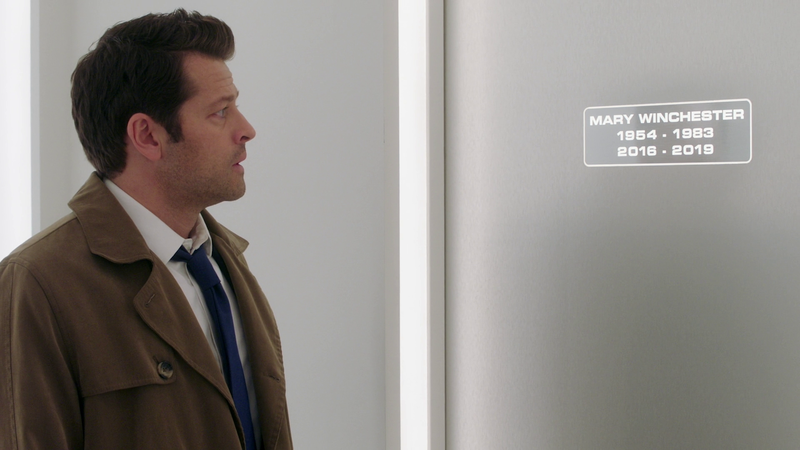
For that matter, Sam himself has died multiple times, and not in the You Only Live Twice sense: he actually dies and goes to heaven, gets resurrected, dies and goes to hell, gets resurrected, and so on and so forth.
Jack: Dying, and coming back to life?
Castiel: Yeah, we've all been through it. It's something of a rite of passage around here.
- "The Spear"
I could go on, but I think you get the picture.
What was that about a demon-possessed corpse?
Sit tight, we're coming to that. But first, we must briefly sum up...
A Hero's Journey
Having been fed demon blood as an infant because of a deal his mother made to save his father's life, Sam Winchester grew up troubled, psychic, and extremely smart, with no healthy attachments to anybody except his big brother Dean. He also grew up to be a great monster hunter, but in the early seasons, he continuously tried to get away from the hunter lifestyle. Attempts at normalcy became less frequent after Dean sold his soul to save Sam's life at the end of season 2, although they re-emerged periodically as late as season 8 before the writers finally gave up on them.
Try though he might, however, Sam could never succeed in becoming normal, mostly because he *checks notes* was bred to be the one true vessel for the fallen archangel Lucifer, which means almost every significant event in his life was engineered by demons who were trying to make him desperate enough to accept the Devil himself into his body.
Oh, and angels were cooperating with said demons because they thought their absent father, God, would return to earth if Sam freed Lucifer from Hell.
The twin diabolical-and-divine conspiracies controlling Sam's fate explain some of the aforementioned blood-drinking and repetitive-orphaning. It does not explain who gets paid to write these things, though.
Anyway, Sam thwarts both Heaven and Hell with a suicide attack against the Devil in the fifth season finale, which was supposed to be the last episode. After the series' surprise renewal, however, Sam comes back to life and a lot more insanity ensues. It eventually turns out all of Sam's reality is being written into existence by God, who keeps throwing more and more apocalypses at the Winchesters because he finds their struggles entertaining.
Thanks to the sadism of the writers both in-universe and out, Sam goes from a pre-law student with a tragic backstory, to a blood-addicted vessel of Lucifer, to a soulless undead revenant, to a re-ensouled psychiatric patient, to a man on a suicidal quest to seal up Hell, to an angel-possessed victim, to a surrogate father to a nephilim (Jack), to the head of a badass multi-versal hunting operation, to a man who shot God, to a happily married father...all without ever pausing to process his trauma. This is a character who, when cursed with nightly visions of ways in which he might kill his own brother, assumes that's a perfectly normal feature of life.
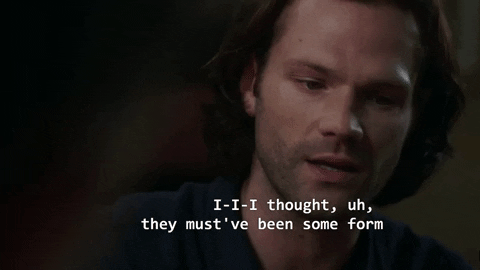
Although he stays sexy, fierce, and improbably resilient throughout, this is not a story about a well-adjusted man.
But about the sexual assault from a corpse, though...
*Trigger Warning*
OK, so when Heaven and Hell were manipulating Sam into releasing Lucifer from his cage, a demon named Ruby inserted herself into his life for seasons 3-4. She pretended to be a friend who could help him unlock his psychic abilities. But at first, Sam refused to trust Ruby because, well, she was a demon possessing a random innocent person's body.
To make Sam more comfortable, and because the actress who originally played her got another job, after season 3 Ruby found a comatose Jane Doe (Genevieve Padalecki) who had just been disconnected from life support, and took over the corpse. While Sam was self-destructing because Dean was in Hell, Corpse!Ruby not only got him addicted to drinking her blood, but also had sex with him. Or, as Dean puts it:
[She's] a manipulative bitch who screwed you, played mind games with you, and did everything in the book to get you to go bad.
When it was shockingly revealed in the season 4 finale that Ruby - who, remember, was an actual demon possessing a corpse - didn't have Sam's best interests at heart, he and Dean killed her.
If you know the show, you're probably already aware that some people will argue that wasn't a sexual assault, simply a self-destructive but consensual relationship. And to that I say, please, just listen to the dialogue in this "seduction" scene. Do you hear any affirmative consent going on?
Yeah, me neither.
I hope you're with me so far, because this is merely a taste of how weird it can be to try to categorize Sam's relationships. It doesn't get much saner from here.
The Study
Finding and watching the entirety of Supernatural has been a lot easier, logistically, than some of our studies for the DFGRR. When we began this project, Supernatural was in its 8th season. For a few years, therefore, I simply tuned in live, while using CW's deal with Netflix to catch up on previous seasons.
On the other hand, though, this took much longer than any of my other watch-throughs, because new seasons of Supernatural just kept coming...and coming...and coming. Understand that this show got old enough to be a high school sophomore. It outlasted 3 presidents plus its original network. Padalecki and his wife, who met while filming season 4, had 3 kids before the finale. This was the show that would not die, the Terminator of network television.
To complicate matters, the plotlines produced after the series' un-cancellation in 2010 were...variable in quality. It was downright difficult to sit through some of them, but I was stuck trying to wait out the showrunners' sense of shame.
I put a lot of time into this step of the study, is what I'm saying, and the eventual finale left me feeling lots of feelings. But on that, more below.
Results
The Women
Despite the ease of finding episodes, it was pretty hard to make a definitive list of girlfriends for Sam Winchester. For our other contestants, we more or less counted just "women he's shown kissing." Sam, however, has a relatively high number of women he sleeps with but doesn't kiss, as well as a disturbingly high number of women who forcibly kiss him. Sam is also constantly meeting women when falling into alternate dimensions, or while trapped inside TV shows, or while suspecting them of being monsters. The level of actual romantic/sexual chemistry can be difficult to gauge.
This left Sam's list open to a certain amount of debate. There are some women who are clear-cut love interests, some casual sex partners, and then a few who fall into the category of "other." It adds up to at least 19, possibly 20, girlfriends.
So let's break this down. Let's start with the...
Casual hookups that Sam engages in over the years
...and by over the years I mean once in Season 4, once in Season 11, and seven times in Season 6, for a total of 9 casual sex partners, of whom 4 get murdered.
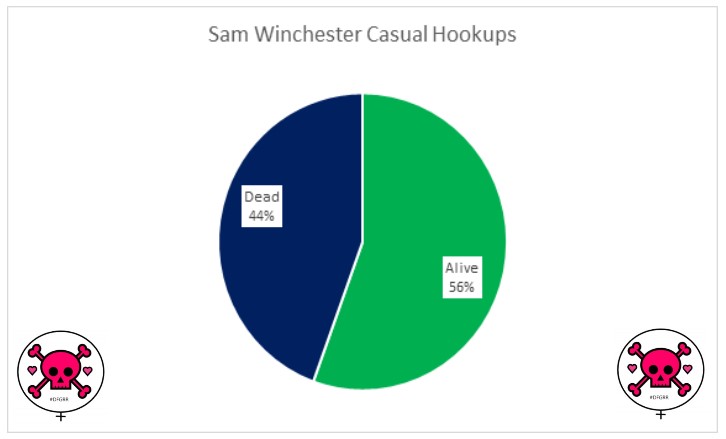
What was going on in season 6?
Ah, you see, Sam had no soul. Recall that Season 5 ended with him going to hell. In Season 6, an angel resurrects his physical body - but accidentally leaves his soul behind. Soulless Sam spends a year without the capacity to feel emotions, focusing only on physical pleasures. This turns him into a very promiscuous boy who runs around hooking up with 4+ women in a single week, hiring sex workers, sleeping with a hunter who's already slept with his uncle and his brother, etc.
As you may already be imagining, there are a few problems with Season 6's artistic choices. See, the writers used Soulless Sam's promiscuity as a way to alert the audience that Something Is Not Right with our previously-more-choosy hero. They never dealt with the unfortunate implication that "enjoying sex = being an amoral husk of a man". Furthermore, they made the awkward decision to have his soullessness make him very good in bed; there's a funny moment where a prostitute genuinely thanks him while he's paying her. Moreover, although Soulless Sam is shown committing actual murders, there is no hint whatsoever that he's become a rapist. Which means that the #1 symptom of Soulless Sam's Not-Rightness is...having lots of consensual, mutually-pleasurable sex.
The horror!
Now, a generous interpretation would be that the writers meant to imply Soulless Sam was disrespecting women. However, if that's the case, why go to the trouble of specifying that he's a good lover when he's uninhibited? Would a true monster give a damn about reciprocating in bed?
(I can already see the shaking heads of ladies who've dated monsters in real life.)
In short, when Supernatural set out to show that Sam had become a monster, it ended up implying that casual sex is evil, and by extension, that women who like it are somehow being victimized. They weren't making the point they thought they were making.
Criticism aside, however, the reality is that all 9 of his casual hookups are consenting adults and, therefore, fully entitled to be included in our list of girlfriends.
Next, let us tabulate the...
Love Interests
This category has fewer problematic implications, at least. These are all women whom Sam has flirted with, taken on dates, and/or married. He has a total of about 8 to 11 true love interests, spread out fairly evenly across the 15 seasons, of whom 5 die and 1 gets resurrected
Most of the deaths in this section are relatively straightforward: Sam meets girl, Sam likes girl, girl gets murdered by Sam's enemies. Of course, there's room in that for the occasional "girl gets infected with lycanthropy and asks Sam to shoot her," "girl gets murdered by Sam's brother," and even "girl survives 9 years after meeting Sam and successfully moves on, only to be murdered by the King of Hell." But they mostly die within the episode where they're introduced.
What do you mean, "about 8 to 11"?
I warned you this was going to get complicated. See, two of these women were in alternate universes:
- In Season 6, Sam bursts through the fourth wall of his reality and into a world where he's not "Sam Winchester," he's actor Jared Padalecki. This fictionalized "Jared," much like the real one, is married to Genevieve Padalecki - whom Sam is horrified to see because she looks exactly like Ruby! And if you think that all sounds painfully meta, you're right.
- In Season 13, Sam, Dean, and Castiel get trapped in the world of Scooby-Doo, where Velma and Sam hit it off.

We could arguably exclude both of them for that reason, but since they did kiss Sam on-screen, we also could include them.
Complicating matters, two other love interests might be the same person, but we don't know because the writers copped out of telling us so. You see, the final 4 minutes of the series finale present flash-forwards of Sam's life after Dean dies, during which he's seen wearing a wedding ring and raising a son...but the audience is never clued in on who Mrs. Winchester is! She appears in the background of exactly one shot, which tells us she's a blondish human in a sundress.
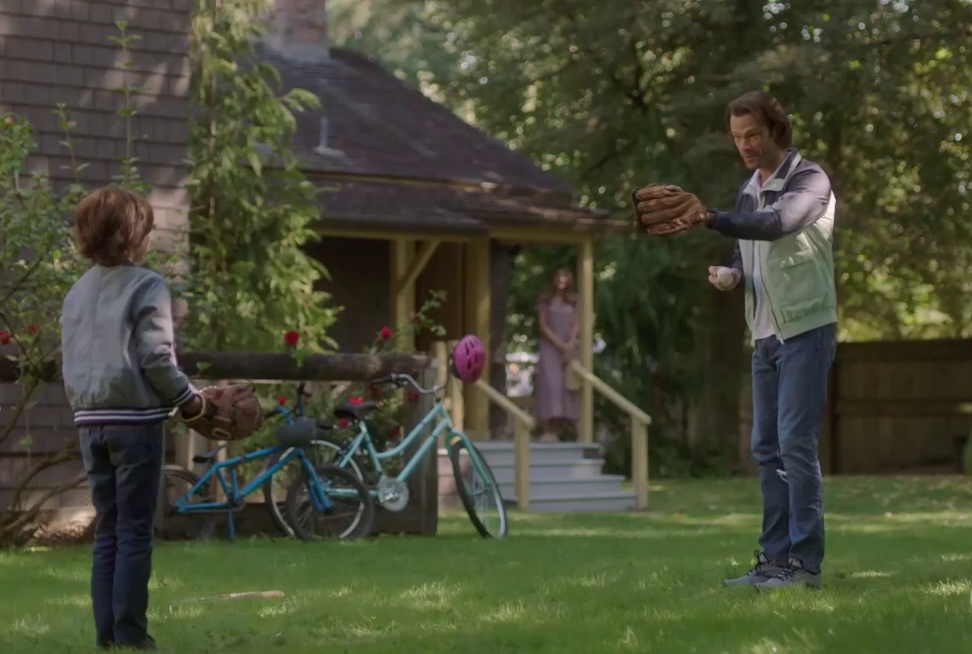
I'd like to offer the following award to the finale showrunners, Andrew Dabb & Robert Singer, for deciding their protagonist's happy ending should rely on a decades-long marriage to someone who hasn't even been identified, let along characterized in the slightest.

Dodging the issues of this woman's identity is a particularly weird decision because Sam actually has a love interest in the final season who could've been "the one": Eileen Leahy. She's a character who dies in season 12, is resurrected by necromancy in season 15, gets raptured 3 episodes before the finale, and then is never even mentioned again - not when the rapture gets undone in the penultimate episode, not when Sam is lonely after Dean dies, never. However, her status as "most recent love interest" has led some fans to assume that Eileen must be the Mrs. Winchester we momentarily glimpse in the ending montage of "Carry On."
So, if we include the AU women and assume "Blurry Sundress" is Eileen, then Sam actually has 10 love interests.
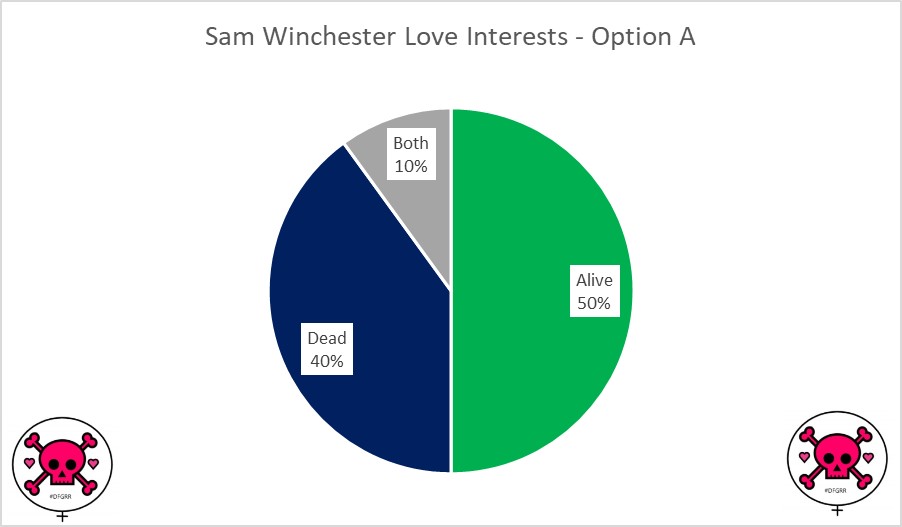
Whereas if we assume Mrs. Sundress is not Eileen, then he has 11:
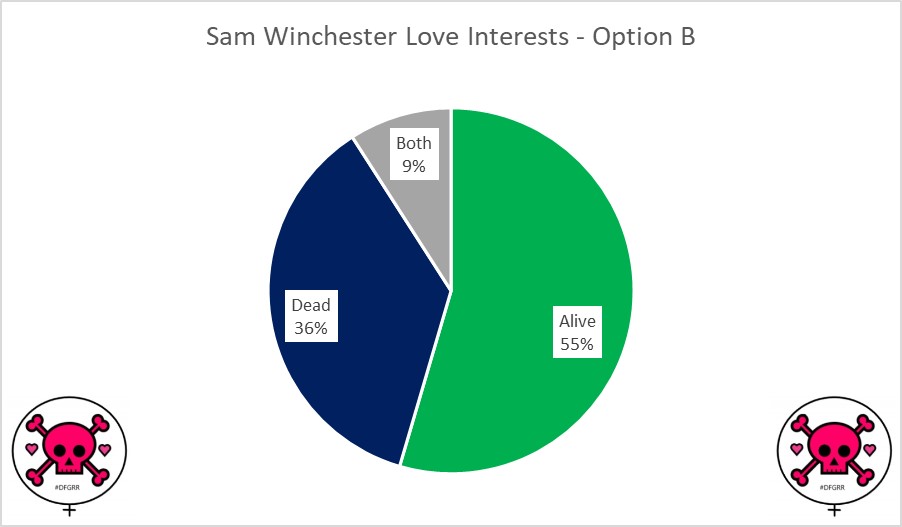
Everyone got that? Good.
Last but not least, we have to address the...
Debatable "Other"
Content Warning: Sexual violence ahead.
Unfortunately, Sam Winchester is put into "other" sexual situations with alarming regularity - situations wherein consent is dubious at best and nonexistent at worst. He's never been kidnapped for breeding purposes a la Captain Kirk, but he has had the following happen.
- Season 4: Ruby (who, and I cannot stress this enough, is a demon possessing a corpse) initiates their sexual relationship by forcing a kiss, and continuing to push her advances even though he says, "that is ANYTHING but ok."
- Season 7: A crazed fangirl of the in-universe Supernatural book series, Becky, doses Sam with demonic love potion and tricks him into a Vegas elopement.
- Season 12: A representative from the British hunters, Lady Bevell, is holding Sam prisoner. She feeds him hallucinogenic potions to make him think they're lovers so that he'll stop resisting.
- Season 14: A reality warper brainwashes Sam into thinking he's a man named "Josh Smith," so he cheerfully goes home and spends the night with his "wife," Cindy Smith.
Phew.
Okay.
What should we take away from this, aside from the urge to get Sam Winchester some therapy?
Well, there might be a few takeaways. First of all, let us be thankful that at least he's not the perpetrator in any of these attacks, unlike James Bond. Not TOO thankful, since that oughtta be the bare minimum, but a tiny bit thankful.
Second, we should realize that the Supernatural audience was supposed to be uncomfortable with the above situations, but not necessarily horrified. The worst fallout from the Cindy Smith plot is that Sam gets teased for how ugly his clothes were when he was "Josh Smith." The situation with Becky is similarly played for laughs, with the punchline being that she's so pathetic she can't get a date to her high school reunion without selling her soul for it. (She and Sam actually part as friends, and Season 15 reveals that she got therapy and became a happily married mother with a successful Etsy business.) After her mind-breaking torture, Lady Bevell and Sam actually team up, without him ever calling her to account or asking for an apology. In every case, the morally reprehensible assaults get brushed off.
And then there's Ruby. What to do with Ruby? See, even though her entire arc is about corrupting Sam, the show seems to think that Ruby and Sam were actually in love. This has been confirmed by showrunner Eric Kripke, as well as both Jared and Genevieve Padalecki in various interviews, DVD commentaries, and convention speeches. In fact, as of season 15 when friendly angel Castiel visits Ruby in the demonic afterlife, she's still into Sam:
.gif)
Blechh. Mind you, this woman is a dead witch whose demonic soul is now possessing a corpse, a corpse which she uses to trick Sam into physical addiction and immoral behavior. I, for one, will cite the authority of Elphaba from Wicked: If that's love, it comes at much too high a cost.
Which brings us to our third takeaway: this is a show that was not worried about the effect that these repeated assaults would have on Sam. The sexual violence was a plot device - and one with remarkably little impact on the plot. Now, we could argue that that's symptomatic of our American outlook on male sexuality and violence. As we've mentioned before, female-on-male sexual assault wasn't even part of the FBI's definition of rape until 2013. And yet. The Supernatural writers chose to include 4 separate sexual attacks in the story, and then refused to feature realistic fallout from any of them. It's not unreasonable to infer that they wanted Sam to be damaged (so as to inspire protective feelings among the audience), but not act too damaged (so as not to force them to *gasp* write realistic emotional reactions!) That, my friends, is authorial laziness at best, and cowardice at worst - an attempt to have one's cake and eat it, too.
If you've been anywhere in pop culture in the past 15 years, you've probably heard it said that rape plots are overused, and that might be true. However, if a screenwriter is going to write yet another rape plot into their TV show, they might at least have the decency to treat it like a rape plot, and not as a joke. Just sayin'.
So, are we gonna count Ruby, Becky, Toni, and Cindy as "girlfriends"?
Sadly, I think we have to. I certainly wouldn't call them girlfriends if any of this happened in real life, since I'd be too busy calling the police. But the DFGRR defers to the text when determining whether a woman shown on screen is a girlfriend. After all, for James Bond we even included Nurse Fearing, whom Bond raped, because the movie presented her as a love interest. In keeping with our policy, since the text of Supernatural treats these situations as romantic, we're going to include these women on Sam's list.
Of the 4 women who sexually or mentally assault Sam, both Ruby and Lady Bevell definitely die, and Cindy Smith was alive last we saw of her. In addition, Becky is shown getting snapped out of existence by an angry God, but she might have come back to life (off-screen) after the heroes drained God's powers in the penultimate episode. Like Eileen, her fate was neither confirmed nor denied.
The debatable "others" are therefore hovering at a 50-75% fatality rate.
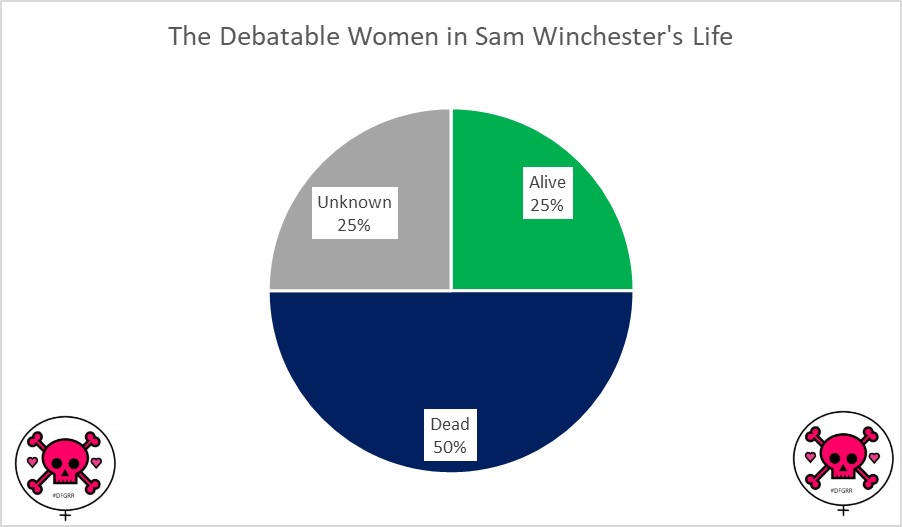
Mortality Rate
All right, with all of the above, Sam ranks in with either 23 or 24 girlfriends (depending on where one lands on the identity of Mrs. Blurry Sundress.) Of those, 11-12 have died and 10-11 are still dead (with Becky and Eileen playing the part of Schrödinger's Cats). This brings us to a mortality rate of either 46%:
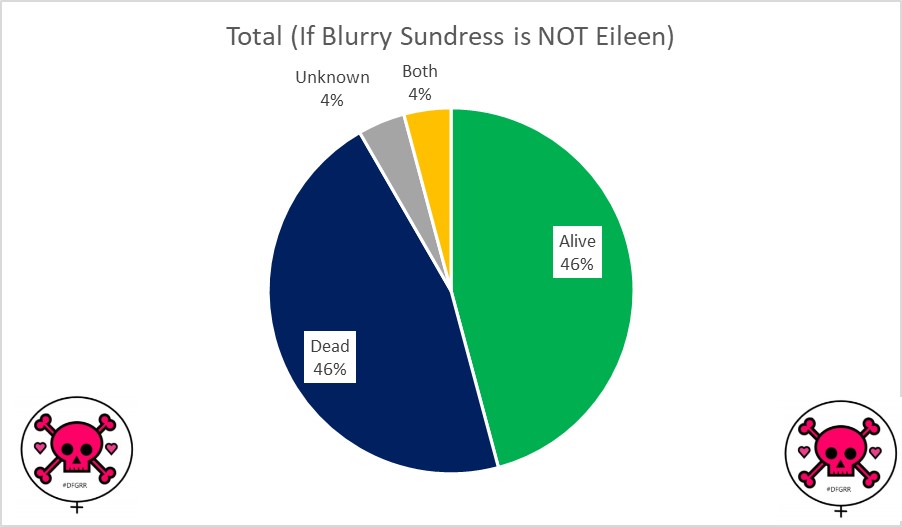
Or 48%:
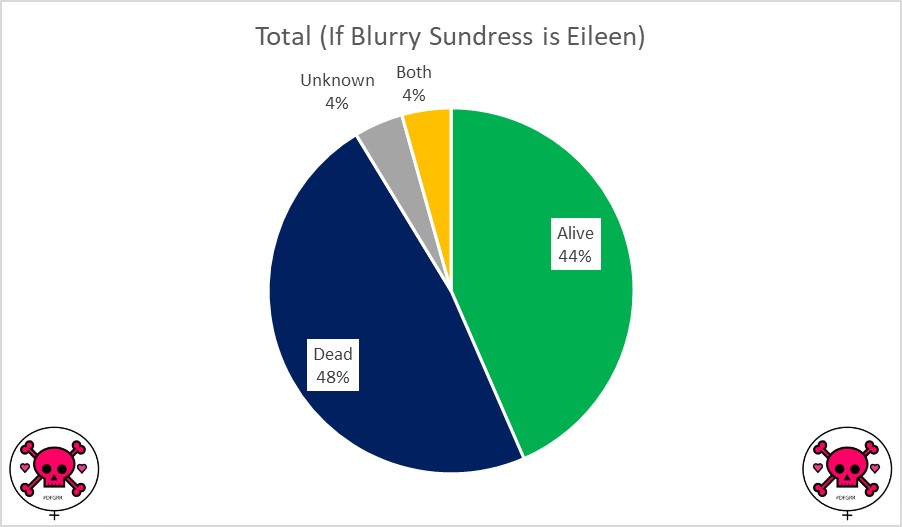
Either scenario gives him a comfortable lead over our other contestants, percentage-wise:
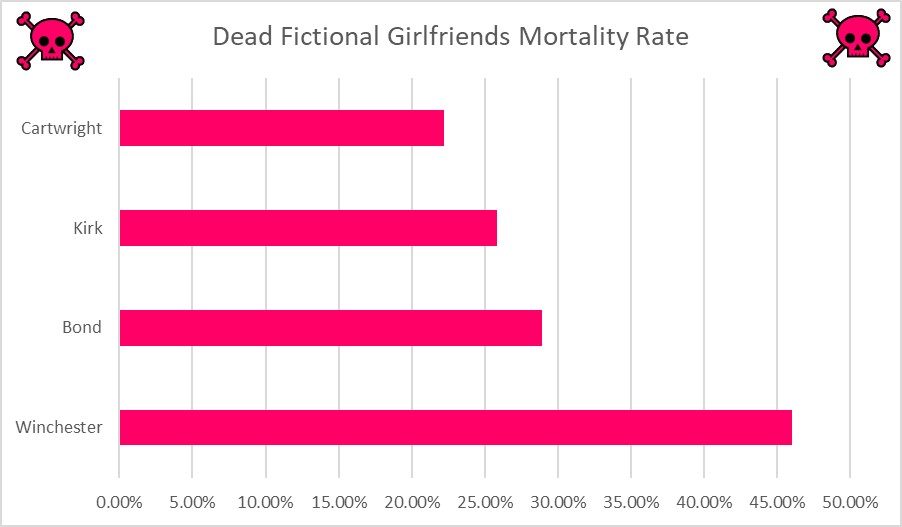
Although he's second to Bond on the raw numbers:
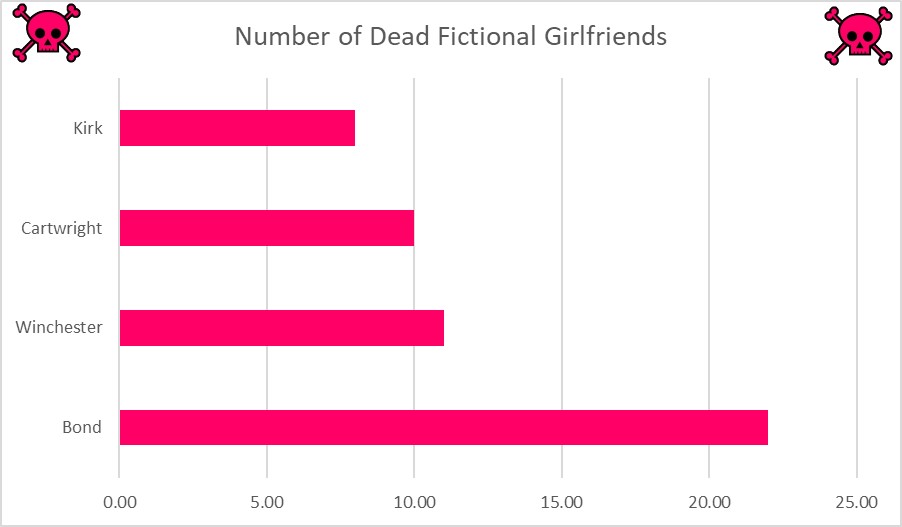
In other words, Sam Winchester finally gets a win!
Causes of Death & Sam's Culpability
Not so fast, though. Despite the wide range of ways for women to die in SPN - or perhaps because of it - Sam never wins a single round of our favorite game, Female Character Cause of Death BINGO.
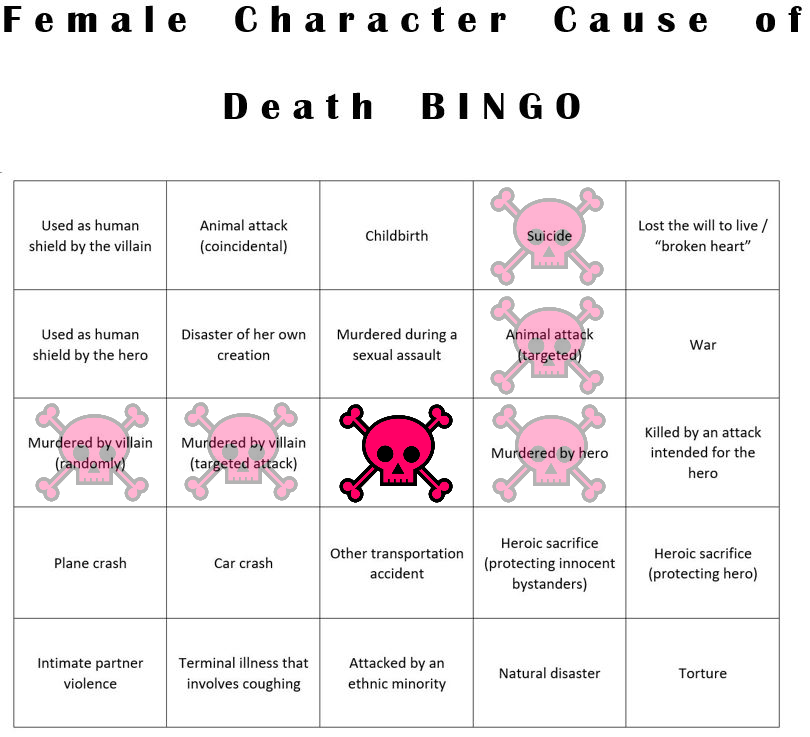
He also has a remarkably favorable score on the question of "how many of these women would be alive if they hadn't met him?" Although he's culpable in roughly 7 of the killings, counting both ones he committed and ones that enemies used to try to get back at him, he also personally resurrected Eileen, which gives him a net "Getting Women Killed" score of only 60%.
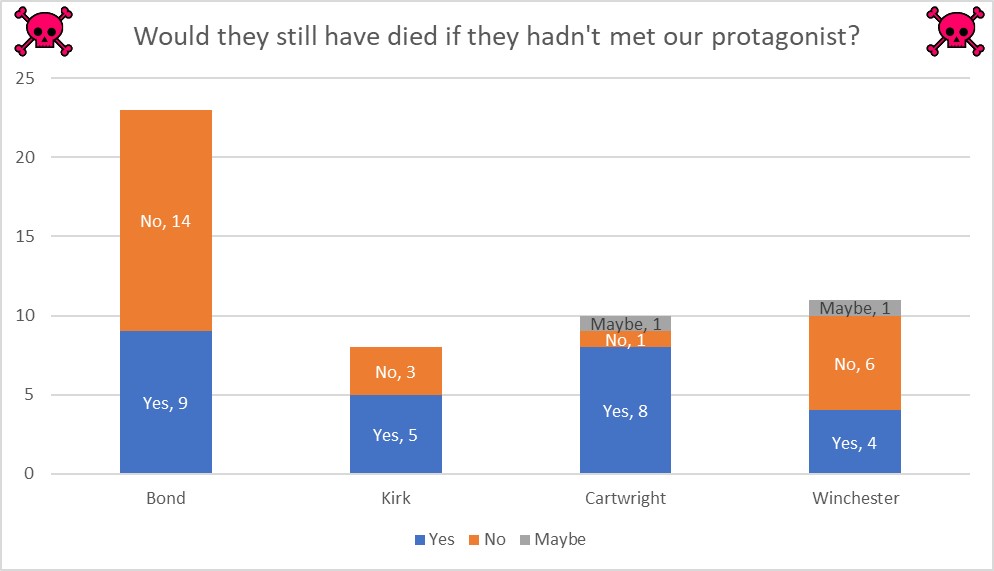
This means he's in second place, after James Bond, for total number of women he got killed.
Hey, I said "remarkably favorable," not "objectively good."
Nefarious Intentions
This is another category in which Sam does slightly better than you might expect, at least on a strictly mathematical scale. With 6 out of 23-24 partners having tried to harm him, he's sitting at a 25-26% nefarious intentions rate. That puts him in third place after Captain Kirk (45.16%) and Joe Cartwright (31.11%).
However, one could argue that Sam is winning if you measure by degree of nefariousness, since the women in Supernatural tend to be more ambitious and/or apocalyptic than those of other franchises. I think it's fair to say that "being a demon manipulating Sam into accepting the Devil into his body" is a bigger deal than, say, "being a Confederate sympathizer who wants Joe to oppose Nevada statehood," by approximately 1-2 orders of magnitude.
With that in mind, I hereby award Sam: Honorable Mention for Number of Times the World Almost Ended Because of His Relationship Issues.
Fertility and Death
Of all the categories I've just spent hours calculating, this one is the simplest. Because the only woman he's ever impregnated is Mrs. "Blurry Sundress" Winchester, and she was alive the one and only time we saw her, Sam's maternal mortality rate is 0%.
That said, however, Sam became an adoptive father at the end of season 12, when he and Dean took charge of raising Jack-the-Devil's-son. It's therefore worth briefly mentioning Jack's mother, Kelly Kline (Courtney Ford.) And I'm sorry to report that Ms. Kline was written like a pro-choice parody of what a pro-lifer's ideal woman would be. This is her arc:
- When she is tricked into sleeping with the actual devil, and conceives a half-archangel/half-human monster (nephilim), she refuses to consider an abortion.
- Later in the season, she learns that giving birth to a nephilim will kill her. So she tries to kill herself, first. She can't, though, because the fetus's will to live is too strong. This convinces her that her unborn baby has saved her.
- Soon enough, Sam and Dean come up with a plan to remove the "angel grace" from her son via prenatal surgery, thus allowing her to deliver a normal human child. Kelly flatly refuses because she doesn't want to "take away the thing that makes him special."
- With the help of a brainwashed Castiel, Kelly sequesters herself at a remote farmhouse, sets up a nursery, and happily prepares to die in childbirth.
- Kelly dies in childbirth, pausing only briefly to explain to a recently-resurrected Mary Winchester, "It's okay. Wouldn't you die for your sons?"
- Mary is inspired to launch a kamikaze attack that gets her trapped in an apocalyptic dimension for the entire thirteenth season.
Whoo boy.
Yeaahhh. In fairness to the writers, since the show is all about things that go bump in the night, it makes some sense to include "mother protecting child" as a character type. In addition, Kelly's sacrifice does bear some plot-advancing fruit, with Jack eventually helping to save the world multiple times. However, Jack also causes Mary's final, permanent death, which means Kelly's blind devotion to her son effectively gets Mary killed twice.
Mary, Kelly, and Mrs. Blurry Sundress are the three most significant mothers in Sam's life. Taken together, the trio could serve as a lesson in "How Not to Write Strong Female Characters." In light of this, I'm going to propose a couple of "Good Questions to Ask about your Mama Bear Characters," for future writers' reference.
- Does this mother have any characterization at all outside of motherhood?
- Does she have independent motivation?
- Does she have a name?
If the answers are "no," your script needs revision. And if the answers are "no, but that won't stand out too much because we don't like to develop female characters all that much on this show," then you need revision. It's 2021, people. You can literally Google how to write women well.
Conclusion
Readers, now that Sam Winchester has whooshed off into the sunset, I can finally answer the question that my dear friend Sarah posed to me back in 2012: "Who do you think has the most dead girlfriends, Sam Winchester, Captain Kirk, or James Bond?" The answer is, "Bond by numbers and Winchester by percentage."
With that, we have come to finale of Phase I for the Dead Fictional Girlfriends' Research Report. And what a finale it has been, with the bizarre plots and the sexual violence and the underwritten women and the statistical variables. Yet when I think about what really sets Supernatural apart, the thing that really puts it ahead of the pack, it's this: Supernatural has no excuses.
Unlike Bonanza, Supernatural's defenders can't yell, "But it's supposed to be a period piece [and therefore there's no point in challenging the status quo]." Despite the obvious differences between their world and ours, the Winchester brothers live in a timeline that's very similar to reality, right down to the existence of #MeToo, Black Lives Matter, and The Shape of Water's Best Picture win. Feminism exists both in-universe and out; the writers just didn't care to pay attention to it.
Unlike Star Trek or James Bond, Supernatural also can't hide behind "times were different when we got started [and therefore it's OK to preserve the franchise's sexism into present day]." This show's finale aired after Joe Biden won the election, less than 1 year ago. We shouldn't need to still be making a case for why Sam's wife deserved a name, or a face, or screen time. And yet, here we are.
I loved Supernatural a lot more in the early days of the DFGRR, when I was still doing this research to settle a simple bet. But now I'm in my ninth year of researching Dead Fictional Girlfriends, and while I can still enjoy some of its better episodes, I'm fairly annoyed by its overall macho tone. In a way, therefore, it was a relief to see it finally find a happy ending and enter the safe confines of TV history, where it shall trouble us feminists no more...

